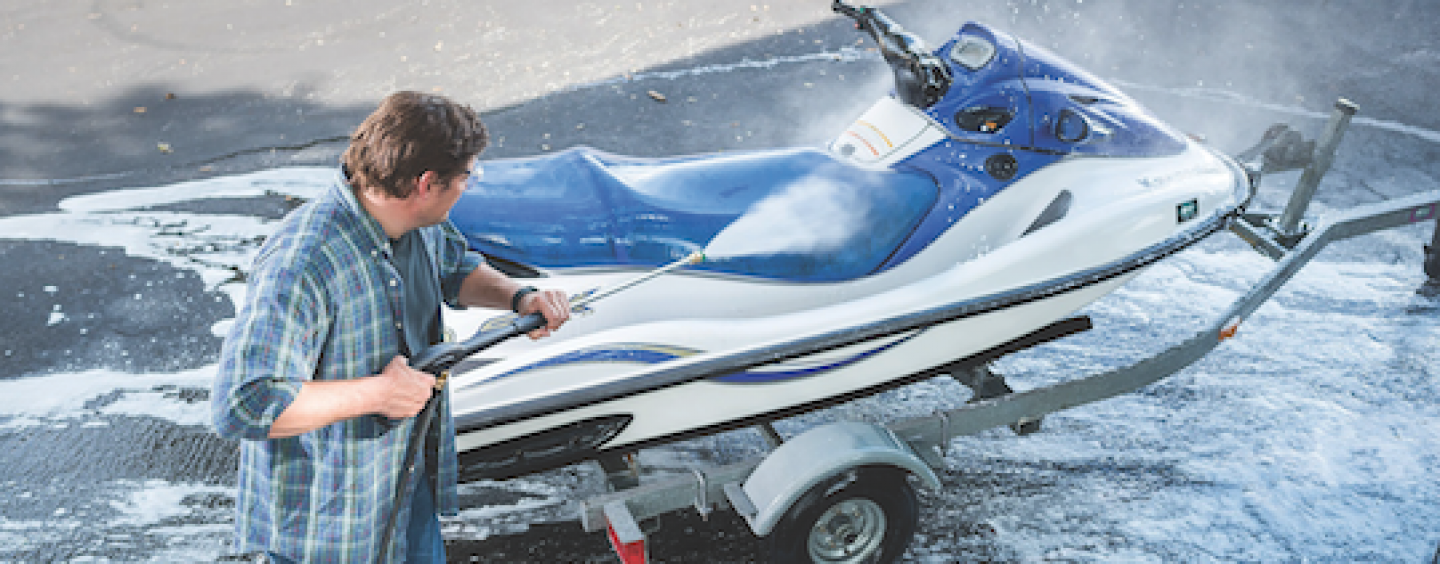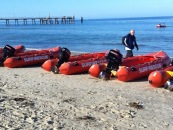Look around the car park at your local boat ramp, and you’ll see boat and PWC trailers in varying states of decay. Some are obviously older trailers, but they are in quite good nick all over, while a couple of the ‘newer’ trailers appear to be falling apart. What’s going on, you wonder?
In most cases, a sad looking trailer is not the result of old age but one of poor cleaning and maintenance after use. Dropping any large metal object in water (particularly the salty kind) means it is going to require a good clean often, to ensure the harmful residues left behind by water are kept to a minimum.
CARING FOR TRAILER’S GALVANISED COATING
While galvanising a trailer’s main frame and major parts provides a strong barrier between the metal and the elements, it does deteriorate over time and loses its ability to protect the trailer. Leaving the residue from a dunking at the ramp on the trailer’s surfaces speeds up this deterioration, particularly when used in saltwater environments.
To minimise the deterioration of the trailer’s galvanising, give the whole trailer a hose-down, followed by a wash with a good cleaning agent, preferably one with salt-removing properties if you have had the trailer in salt water. An old small house broom is a great tool for getting into the trailer’s nooks and corners. Pay particular attention to thoroughly soaking and washing the trailer brake system’s mechanical parts, if fitted, along with the axle, hubs, rims and moving suspension parts. After the trailer dries, a spray with a good corrosion inhibitor (such as inox) on the trailer’s moving parts and joints is highly recommended.
ALLOY TRAILERS
Trailers made of aluminium are becoming more common, and it is a great material to use due to its light weight and corrosion-resistance. However, even an alloy trailer is prone to premature wear if left with water and salt residue build-up on the surface. And as most alloy trailers still have a large amount of galvanised parts, it is recommended to follow the same wash-down procedure as a galvanised trailer.
KEEPING DRAIN HOLES CLEAR
Many trailers have drainage holes along the length of the frame rails to ensure water escapes and does not sit inside the metal. It is important to ensure these drainage holes remain clear, as they can easily become blocked with leaves, weeds and other material picked up around the boat ramp. Regularly checking and clearing these holes is a great way to make sure water is not sitting in your trailer’s frame rails and causing deterioration of the metal.
To give the inside of your trailer’s frame rails a good wash, block the ends of the trailer’s frame rails with old rags, and fill the rail a good salt- removing cleaning agent/water mixture. Let this sit for a few minutes before removing the rags and running clean water through. Once dry a final squirt of a good rust inhibitor, such as inox, into the trailer’s frame rails from any access points will help keep the inside of the frame rails clean and moisture free.
LUBRICATION
The moving parts of a trailer are most often fitted with grease nipples or lubrication points for adding fresh grease. Use a good quality marine- grade grease every few trips to push fresh grease through, and wipe away any excess old grease that is pushed out.
One of the most important lubrication points on a trailer is the wheel bearings. A regular check and top-up of the grease ensures the bearings keep cool and do their job, reducing the risk of a bearing failure, which can lead to catastrophic results. Many trailers have bearing protection systems, which give added protection from water and the elements, plus a simplified way of adding grease to the bearing.
Give any sliding items, such as suspension parts and jockey wheels, a spray of a lubricating corrosion inhibitor, or a light smear of grease
occasionally. Your coupling should also come in for a quick bit of attention, with a good soak with your cleaning solution followed by a spray with a lubricating corrosion inhibitor on the moving parts, and the grease nipple will need a squeeze of clean grease from time to time as well.
LIGHTS AND ELECTRICAL
The lights and electrical items on a boat or PWC trailer these days are fairly rugged, usually featuring sealed LED lights and sealed wiring running uninterrupted to the plug at the front of the trailer. It is still a good idea to wash the lights off well, and spray the back of them with a good moisture and corrosion inhibitor now and then. Giving the plug at the other end a quick wipe and spray is also recommended to keep the electrical connectors in good condition.
REGULAR CLEAN = LONG TRAILER LIFE
Giving your boat or PWC trailer a clean at the same time as your vessel after use is a good habit to get into. You will be rewarded for the small extra effort with a trailer that will safely carry your watercraft for many more years than a trailer left to the elements. And it will most likely save your hip pocket as well, you won’t be replacing rusted or corroded components just to keep your trailer working.
It is import to service your trailer every 12 months. Oceanic Marine offers service and repairs. When the time comes to replace your trailer, they have a full range of locally built Australian manufactured trailers. www.oceanictrailers.com.au
By Phil Peterson, Oceanic Trailers
Published in the Jan-Mar 2020 edition.






























